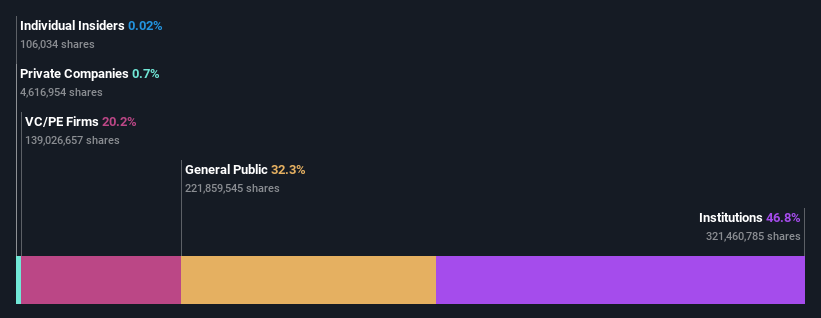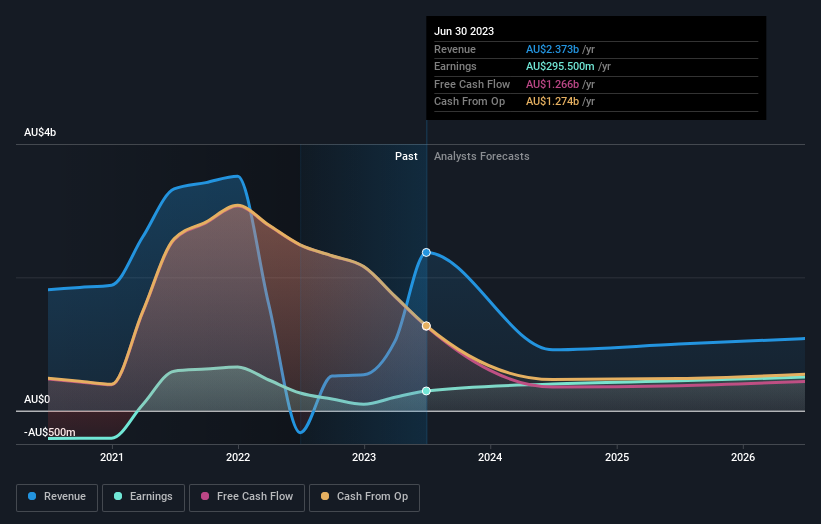- Australia
- /
- Diversified Financial
- /
- ASX:CGF
An excellent week for Challenger Limited's (ASX:CGF) institutional owners who own 47% as one-year returns inch higher
Key Insights
- Institutions' substantial holdings in Challenger implies that they have significant influence over the company's share price
- 53% of the business is held by the top 5 shareholders
- Analyst forecasts along with ownership data serve to give a strong idea about prospects for a business
To get a sense of who is truly in control of Challenger Limited (ASX:CGF), it is important to understand the ownership structure of the business. The group holding the most number of shares in the company, around 47% to be precise, is institutions. In other words, the group stands to gain the most (or lose the most) from their investment into the company.
And things are looking up for institutional investors after the company gained AU$137m in market cap last week. One-year return to shareholders is currently 5.4% and last week’s gain was the icing on the cake.
Let's take a closer look to see what the different types of shareholders can tell us about Challenger.
View our latest analysis for Challenger

What Does The Institutional Ownership Tell Us About Challenger?
Institutional investors commonly compare their own returns to the returns of a commonly followed index. So they generally do consider buying larger companies that are included in the relevant benchmark index.
We can see that Challenger does have institutional investors; and they hold a good portion of the company's stock. This suggests some credibility amongst professional investors. But we can't rely on that fact alone since institutions make bad investments sometimes, just like everyone does. If multiple institutions change their view on a stock at the same time, you could see the share price drop fast. It's therefore worth looking at Challenger's earnings history below. Of course, the future is what really matters.

We note that hedge funds don't have a meaningful investment in Challenger. Looking at our data, we can see that the largest shareholder is Apollo Global Management, Inc. with 20% of shares outstanding. For context, the second largest shareholder holds about 15% of the shares outstanding, followed by an ownership of 8.1% by the third-largest shareholder.
On looking further, we found that 53% of the shares are owned by the top 5 shareholders. In other words, these shareholders have a meaningful say in the decisions of the company.
While studying institutional ownership for a company can add value to your research, it is also a good practice to research analyst recommendations to get a deeper understand of a stock's expected performance. There are a reasonable number of analysts covering the stock, so it might be useful to find out their aggregate view on the future.
Insider Ownership Of Challenger
The definition of an insider can differ slightly between different countries, but members of the board of directors always count. Management ultimately answers to the board. However, it is not uncommon for managers to be executive board members, especially if they are a founder or the CEO.
Insider ownership is positive when it signals leadership are thinking like the true owners of the company. However, high insider ownership can also give immense power to a small group within the company. This can be negative in some circumstances.
Our data suggests that insiders own under 1% of Challenger Limited in their own names. Keep in mind that it's a big company, and the insiders own AU$689k worth of shares. The absolute value might be more important than the proportional share. It is always good to see at least some insider ownership, but it might be worth checking if those insiders have been selling.
General Public Ownership
With a 32% ownership, the general public, mostly comprising of individual investors, have some degree of sway over Challenger. This size of ownership, while considerable, may not be enough to change company policy if the decision is not in sync with other large shareholders.
Private Equity Ownership
With an ownership of 20%, private equity firms are in a position to play a role in shaping corporate strategy with a focus on value creation. Some might like this, because private equity are sometimes activists who hold management accountable. But other times, private equity is selling out, having taking the company public.
Next Steps:
It's always worth thinking about the different groups who own shares in a company. But to understand Challenger better, we need to consider many other factors. Consider risks, for instance. Every company has them, and we've spotted 2 warning signs for Challenger you should know about.
But ultimately it is the future, not the past, that will determine how well the owners of this business will do. Therefore we think it advisable to take a look at this free report showing whether analysts are predicting a brighter future.
NB: Figures in this article are calculated using data from the last twelve months, which refer to the 12-month period ending on the last date of the month the financial statement is dated. This may not be consistent with full year annual report figures.
New: AI Stock Screener & Alerts
Our new AI Stock Screener scans the market every day to uncover opportunities.
• Dividend Powerhouses (3%+ Yield)
• Undervalued Small Caps with Insider Buying
• High growth Tech and AI Companies
Or build your own from over 50 metrics.
Have feedback on this article? Concerned about the content? Get in touch with us directly. Alternatively, email editorial-team (at) simplywallst.com.
This article by Simply Wall St is general in nature. We provide commentary based on historical data and analyst forecasts only using an unbiased methodology and our articles are not intended to be financial advice. It does not constitute a recommendation to buy or sell any stock, and does not take account of your objectives, or your financial situation. We aim to bring you long-term focused analysis driven by fundamental data. Note that our analysis may not factor in the latest price-sensitive company announcements or qualitative material. Simply Wall St has no position in any stocks mentioned.
About ASX:CGF
Solid track record with adequate balance sheet.
Similar Companies
Market Insights
Community Narratives




